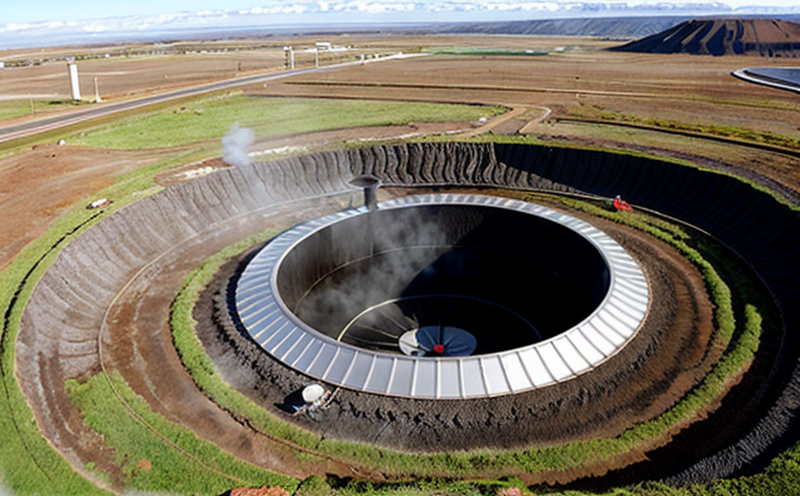ISO 50001 Energy Management System Testing in Geothermal Plants
The International Organization for Standardization (ISO) has established a suite of standards designed to help organizations optimize their energy performance and reduce carbon footprints. ISO 50001 is specifically dedicated to the implementation, maintenance, and continual improvement of an Energy Management System (EMS). This standard provides a framework that helps businesses identify opportunities for reducing energy consumption and costs while enhancing overall environmental sustainability.
In the context of geothermal plants, which are crucial components of renewable energy systems, ISO 50001 offers a structured approach to managing energy resources efficiently. Geothermal power generation involves extracting heat from beneath the Earth's surface to convert it into electricity. The process requires precise control and management of various parameters such as temperature, pressure, and fluid flow, all of which contribute to the overall efficiency of the plant.
Implementing ISO 50001 in a geothermal plant ensures that energy resources are used optimally throughout the operation lifecycle. This includes optimizing heat exchanger performance, managing steam distribution systems, and ensuring efficient pump operations. By adhering to this standard, organizations can significantly reduce operational costs, minimize environmental impact, and improve reliability.
The testing process for ISO 50001 in geothermal plants involves several key steps. Initially, a comprehensive energy audit is conducted to identify areas where improvements can be made. This includes monitoring the consumption of energy across all processes within the plant. Following this assessment, an EMS is established and integrated into daily operations.
Instrumentation plays a critical role in this process. Sensors are deployed throughout the geothermal system to measure key variables like temperature, pressure, flow rate, and power consumption. These measurements provide real-time data that can be used to fine-tune operational parameters. For instance, if certain sections of the plant are consuming more energy than others, adjustments can be made to reduce this inefficiency.
Once the EMS is in place, ongoing monitoring and review become essential components of maintaining compliance with ISO 50001. Regular audits ensure that all processes adhere to established protocols and that any deviations from expected performance are addressed promptly. This continuous improvement cycle helps geothermal plants stay at the forefront of sustainable energy practices.
- Reduction in operational costs through optimized resource use
- Enhanced environmental sustainability by minimizing carbon emissions
- Improved reliability and uptime for critical plant components
- Achievement of regulatory compliance with international standards
The implementation of ISO 50001 in geothermal plants not only contributes to the overall efficiency but also provides tangible benefits. By adhering to this standard, organizations can demonstrate their commitment to sustainability and reduce their environmental footprint.
Benefits
- Cost savings through optimized energy use
- Emission reductions, contributing to environmental goals
- Improved operational efficiency and reliability
- Enhanced reputation among stakeholders
- Increased competitiveness in the market
- Streamlined processes for better resource management
Quality and Reliability Assurance
The quality assurance process in ISO 50001 involves rigorous testing to ensure that all aspects of the energy management system meet specified criteria. This includes regular audits, performance reviews, and corrective actions when deviations are detected. The reliability aspect ensures that the geothermal plant can operate consistently without interruptions.
Testing parameters include monitoring key performance indicators (KPIs) such as energy efficiency ratios, power factor correction levels, and system availability rates. By maintaining these metrics within acceptable ranges, the quality and reliability of the plant operations are assured.
Data collected from sensors is analyzed using advanced analytical techniques to identify trends and patterns that could indicate potential issues or areas for improvement. This proactive approach helps in preventing costly downtime and ensuring smooth operation.
Customer Impact and Satisfaction
- Improved service reliability leading to higher customer satisfaction
- Promotion of sustainable practices that align with customer values
- Cost-effective solutions that reduce operational expenses
- Evidence of compliance with international standards, building trust
The implementation of ISO 50001 in geothermal plants has a direct positive impact on customers by ensuring reliable and efficient service. This translates into higher customer satisfaction as they witness the tangible benefits of sustainable practices.
By adhering to this standard, organizations can demonstrate their commitment to sustainability, which resonates with environmentally conscious customers. Additionally, the cost-effective solutions provided through optimized energy use contribute significantly to reducing operational expenses, thereby enhancing overall profitability and competitiveness in the market.





